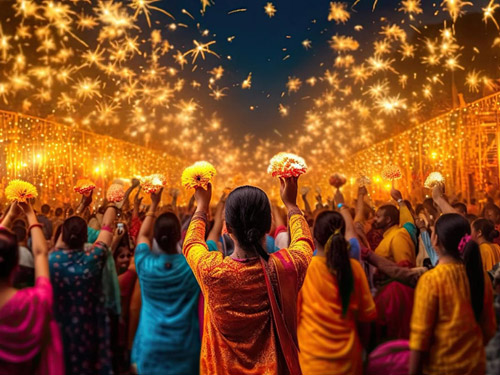Addressing Gender Inequality in Festivals: A Call for Inclusive Celebrations
India, known for its rich tapestry of festivals, sees millions celebrating across the country with zeal and enthusiasm. However, behind the grand festivities lies a persistent issue—gender inequality. Despite the joy and colors, many festivals contribute to reinforcing traditional gender roles that exacerbate gender-based labor gaps both in the home and outside. This article delves into how Indian festivals impact gender disparities, particularly focusing on unpaid labor, economic participation, and stereotypes, and offers strategies for making these cultural events more inclusive.
The Burden of Unpaid Domestic Labor on Women
A significant issue that arises during festivals is the disproportionate burden of unpaid domestic labor placed on women. Women are traditionally tasked with preparing for celebrations, which includes cleaning, decorating, cooking, and organizing family events. This heavy load of household chores leaves women with limited opportunities to engage in income-generating activities or to pursue personal interests. As a result, festivals inadvertently reinforce the stereotype that domestic labor is primarily the domain of women, perpetuating gendered labor divisions.
Economic Inequality and Limited Participation
Festivals often reinforce traditional gender roles that limit women’s economic participation. As women are more likely to be responsible for household chores, their ability to engage in economic activities outside the home is restricted. Furthermore, festival-related occupations, such as those in idol making, event organizing, and procession planning, are typically male-dominated. This exclusion from festival-related industries limits women’s economic opportunities, which contributes to the ongoing gender wage gap.
Reinforcement of Gender Stereotypes and Lack of Recognition
In many festivals, media representations, advertisements, and cultural narratives perpetuate rigid gender stereotypes. Women are often shown in nurturing, homemaker roles, while men are depicted as providers and leaders. These portrayals not only limit women’s potential but also undermine the valuable contributions women make to festival preparations. Despite women’s extensive involvement, their efforts are frequently undervalued or overlooked, reinforcing gender inequality both at the personal and societal levels.
Social Pressures and Criticism of Non-Conformity
Festivals amplify social expectations, making it more challenging for individuals to break free from traditional gender norms. Women who attempt to challenge these roles—by pursuing leadership positions or opting out of traditional responsibilities—often face criticism and social pressure. This fear of judgment can discourage women from breaking the cycle of inequality, further entrenching gendered expectations and limiting their opportunities during festive times.
Steps Toward Gender-Inclusive Festival Celebrations
While many festivals continue to perpetuate gender inequalities, change is possible. Some communities and organizations are already evolving, embracing gender equality during celebrations. Below are several steps organizations can take to ensure that festivals are more inclusive and promote gender equality:
-
Promote Gender Diversity Training: Educate employees about the importance of gender inclusion during festival celebrations. Offering training on diversity and inclusion helps foster an environment that values all genders equally.
-
Offer Flexible Work Schedules: Provide flexible work hours or time-off policies during festivals so that employees can participate in the cultural and religious observances important to them, without compromising their work commitments.
-
Educational Initiatives: Organize workshops and awareness programs to help employees understand the cultural significance of various festivals. These initiatives promote respect for diverse traditions and encourage inclusivity.
-
Host Gender-Inclusive Celebrations: Ensure that festival events at the workplace are open and accessible to all genders. Encourage employees to share their customs and traditions, fostering a collective celebration that values diversity.
-
Use Inclusive Language: Promote the use of inclusive language in communications related to festivals, and avoid assuming that all employees will participate in the same way or hold similar cultural beliefs.
-
Gender-Neutral Dress Code: If your organization has a dress code, ensure it is flexible and inclusive. Employees should feel comfortable expressing their identity through attire, without being bound by gender-specific clothing rules.
-
Support Employee Resource Groups: Encourage the creation of employee resource groups or cultural affinity groups to help plan and execute festival celebrations. These groups can also offer guidance on fostering an inclusive environment.
-
Promote Equal Leadership Opportunities: Ensure that leadership roles within festival committees or organizing groups are open to all employees, regardless of gender. This empowers women to take on decision-making roles, which can help reshape traditional gender roles.
-
Regular Policy Review: Review HR policies to ensure they align with principles of gender equality and do not inadvertently promote stereotypes during festival celebrations.
-
Accessibility: Ensure that all employees, regardless of physical ability, can access festival events. This includes considering dietary restrictions, mobility needs, and other factors that may affect participation.
-
Zero Tolerance for Discrimination: Create a clear, zero-tolerance policy for any form of gender discrimination or bias during festivals. Employees should feel safe reporting any incidents of harassment or exclusion.
-
Feedback Mechanisms: Allow employees to provide feedback on how festivals are celebrated within the organization, ensuring their voices are heard and that improvements are made for future celebrations.
-
Community Engagement: Partner with local organizations that support gender-inclusive events or initiatives, reinforcing a broader cultural shift toward equality in festival celebrations.
-
Leadership Support: Senior leadership must actively support and demonstrate a commitment to gender inclusivity, both during festivals and throughout the year.
Conclusion
Indian festivals are a powerful reflection of cultural traditions and community spirit. However, it’s essential that these celebrations evolve to challenge gendered norms and promote inclusivity. By creating a workplace culture that values diversity, equity, and inclusion, organizations can ensure that festivals become a time of collective joy, where all employees, regardless of gender, are equally represented and respected. Through these efforts, we can begin to dismantle the gender disparities perpetuated by traditional festival roles and create more inclusive spaces for everyone.
#genderinclusion #diversity #workplaceequality #culturalcelebrations #festivalsequality #genderstereotypes #inclusiveworkplace #genderneutral #POSHAct #workplacesafety


